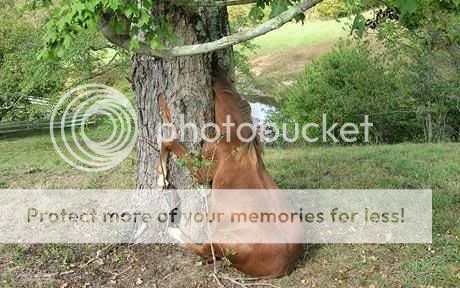- Jun 14, 2009
- 1,735
- 32
- 161
Okay, first thing, my wife got a horse.
Tell me everything I need to know about horses in ten words or less.
He is a paint gelding about 4 years old, very calm, very laid back, easy to handle, like a big huge puppy.
Got hay, good clean bahayia, 12% horse and mule feed. Got all the certificates for his test and vac.
Right now he is in the backyard drinking water out of the above ground swimming pool. Then he stands in front of the back window, looking in the house, making horse noises. Must be wanting somebody to come out and play or he may want to come in and watch TV. Guess he'll be staying on the back porch if it rains.
I figure he is a little bit light for his frame, maybe he needs to be fed up some. Currently he has some green grass in the backyard, I'll keep hay in front of him. But how much feed and grain does he need? I fed him about 1 gallon total today, half this morning half this afternoon. I guess now mind you just guessing he goes about 700 lbs. Course it felt like a ton and a half when he stepped on my foot this morning.
I am not a total novice when dealing with a horse, but it has been ages and ages.
Tell me everything I need to know about horses in ten words or less.
He is a paint gelding about 4 years old, very calm, very laid back, easy to handle, like a big huge puppy.
Got hay, good clean bahayia, 12% horse and mule feed. Got all the certificates for his test and vac.
Right now he is in the backyard drinking water out of the above ground swimming pool. Then he stands in front of the back window, looking in the house, making horse noises. Must be wanting somebody to come out and play or he may want to come in and watch TV. Guess he'll be staying on the back porch if it rains.
I figure he is a little bit light for his frame, maybe he needs to be fed up some. Currently he has some green grass in the backyard, I'll keep hay in front of him. But how much feed and grain does he need? I fed him about 1 gallon total today, half this morning half this afternoon. I guess now mind you just guessing he goes about 700 lbs. Course it felt like a ton and a half when he stepped on my foot this morning.
I am not a total novice when dealing with a horse, but it has been ages and ages.
Last edited:




